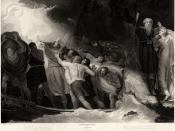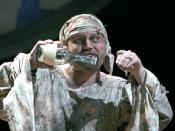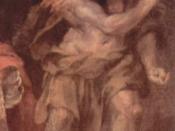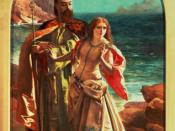Act II, scene ii introduces Trinculo and Stefano, the last new characters to be introduced in the play so far. They act as comic foils to the main action, and will in later acts become specific parodies of Antonio and Sebastian. At this point, their role is to present comically some of the more serious issues in the play concerning Prospero and Caliban. In Act I, scene ii, Prospero calls Caliban a ÃÂslaveÃÂ, ÃÂthou earthÃÂ, ÃÂFilthÃÂ, and ÃÂHag-seedÃÂ. Stefano and TrinculoÃÂs epithet of choice in Act II, scene ii and thereafter is ÃÂmonster.ÃÂ But while these two make quite clear that Caliban is seen as less than human by the Europeans on the island, they also treat him more humanely than Prospero does. Stefano and Trinculo, a butler and a jester respectively, remain at the low end of the social scale in the play, and have little difficulty finding friendship with the strange islander they meet.
ÃÂMisery acquaints a man with strange bedfellows,ÃÂ says Trinculo (lines 36-37), and then hastens to crawl beneath CalibanÃÂs garment in order to get out of the rain. The similarity, socially and perhaps physically as well, between Trinculo and Caliban is further emphasized when Stefano, drunk, initially mistakes the two for a single monster: ÃÂThis is some monster of the isle with four legsÃÂ (line 62). The scene itself thus involves low comedy, the kind that depends more on actions than words. Caliban, Stefano, and Trinculo are funny because the audience thinks their efforts ridiculous, not to mention that Stefano is drunk and that Trinculo rode the storm to safety in a wine cask. Although Sebastian and AntonioÃÂs plot might represent real danger to Alonso, Trinculo and StefanoÃÂs plot can only represent failure. Their plan to murder Prospero and claim Miranda is doomed from the start, and the audience is always aware of this. In their drunkenness, they are ridiculous and thus can be enjoyed. Caliban, in his innocence, he has allied himself with buffoons. He bribes his accomplices with promises of choice foods and is too unsophisticated to realize that these men would also enslave him if given the opportunity. Thus, Stefano and Trinculo represent the worst that civilization has to offer while also providing a comical contrast to the more serious plot of Antonio and Sebastian.
Shakespeare, William. The Tempest, ed. G. Blakemore Evans. Boston: Houghton Mifflin, 1974.





